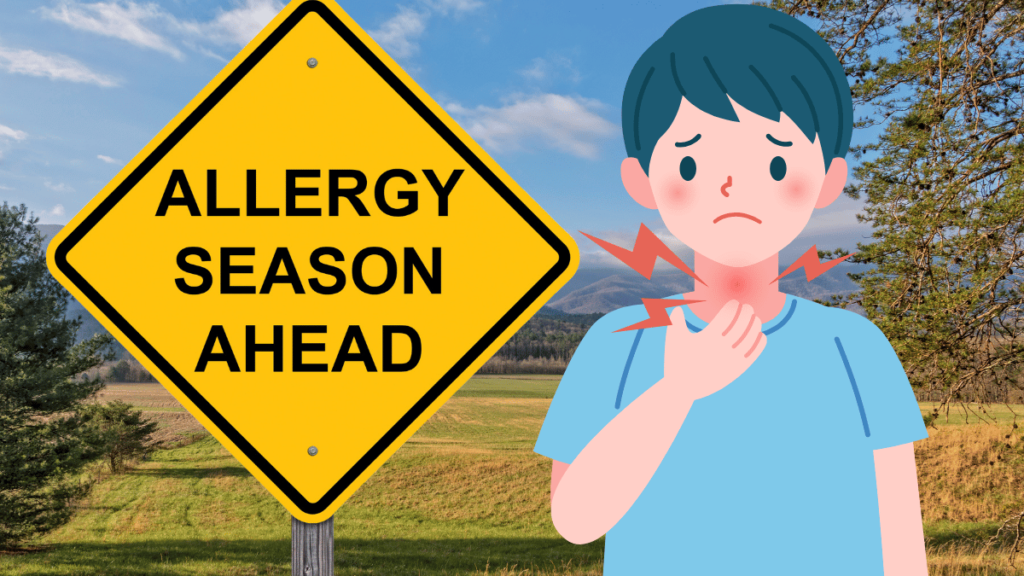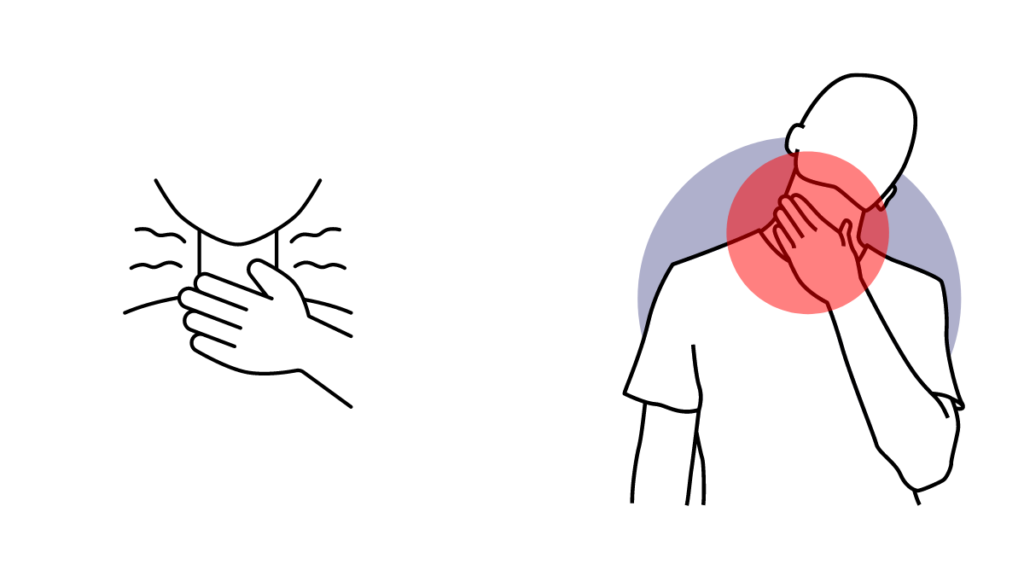Can Allergies Cause a Sore Throat? Understanding the Connection
Allergies occur when the immune system reacts excessively to substances that are usually harmless. These substances, known as allergens, can provoke a range of symptoms in sensitive individuals. Some of the most common allergens and their effects include:
Pollen: Pollen from trees, grasses, and weeds is a major trigger for seasonal allergic rhinitis, often called hay fever. This type of allergy can cause symptoms such as sneezing, runny or itchy nose, itchy or watery eyes, and sometimes a sore throat. People might experience these symptoms during specific seasons when pollen counts are high.
Dust Mites: Dust mites are tiny creatures that live in household dust, particularly in bedding, carpets, and upholstered furniture. Allergies to dust mites can lead to symptoms similar to those of pollen allergies, including sneezing, nasal congestion, and itchy eyes. They can also trigger asthma symptoms, such as wheezing and shortness of breath.
Pet Dander: Proteins found in the skin flakes, urine, and saliva of pets, particularly cats and dogs, can cause allergic reactions. People allergic to pet dander might experience sneezing, runny or stuffy nose, itchy eyes, and sometimes skin rashes. Pet dander can also exacerbate asthma symptoms.
Mold: Mold spores, which can be found both indoors and outdoors, are another common allergen. Mold allergies can cause sneezing, nasal congestion, coughing, and itchy eyes. Mold exposure can also trigger asthma attacks and exacerbate existing respiratory issues.
Food: Certain foods, such as peanuts, tree nuts, shellfish, milk, eggs, and soy, are well-known for causing allergic reactions. Food allergies can range from mild symptoms like hives and stomach discomfort to severe reactions such as anaphylaxis, which is a potentially life-threatening condition requiring immediate medical attention.
Insect Stings: Stings from insects like bees, wasps, and hornets can cause allergic reactions in some people. Reactions can vary from localized pain and swelling to severe systemic reactions such as anaphylaxis.
Medications: Some people have allergies to specific medications, including antibiotics like penicillin or nonsteroidal anti-inflammatory drugs (NSAIDs). Reactions can range from skin rashes and itching to more severe reactions like difficulty breathing.
How Allergies Lead to a Sore Throat
Allergies can lead to a sore throat through several mechanisms related to the body’s inflammatory response to allergens.
Mechanisms Behind Allergic Reactions
When an allergen is inhaled, ingested, or comes into contact with the skin, the immune system may overreact, mistakenly identifying the harmless substance as a threat. This triggers the release of chemicals like histamine from immune cells. The primary mechanisms behind allergic reactions that lead to a sore throat include:
- Histamine Release: Histamine is a chemical released by mast cells and basophils during an allergic response. It causes blood vessels to dilate and become more permeable, leading to fluid leakage into surrounding tissues. This can cause inflammation and swelling in areas like the throat, which can lead to discomfort and a sore throat.
- Postnasal Drip: Allergens can irritate the nasal passages, leading to increased mucus production. This excess mucus can drip down the back of the throat, especially when lying down or sleeping. The constant drip of mucus can irritate the throat lining, resulting in a sore throat.
- Inflammation: The inflammatory response to allergens can affect the throat tissues directly. The swelling and irritation caused by histamine and other inflammatory mediators can lead to a sore, scratchy, or itchy throat.
- Sinus Congestion: Allergic reactions can cause congestion in the sinuses, which can contribute to a sore throat. When the sinuses are congested, mucus may accumulate and drain down the throat, irritating it and causing discomfort.
Symptoms of Allergic Sore Throat
A sore throat caused by allergies often presents with specific symptoms:
- Scratchy or Itchy Sensation: An allergic sore throat might feel scratchy or itchy, rather than the raw, painful feeling typically associated with infections.
- Mild Pain or Discomfort: The pain associated with an allergic sore throat is generally milder compared to the severe pain seen with infections like strep throat. It can range from a slight discomfort to a more noticeable ache.
- Dryness: An allergic sore throat might be accompanied by a dry feeling, which can be exacerbated by mouth breathing, especially if nasal congestion is also present.
- Postnasal Drip Symptoms: If postnasal drip is a factor, the sore throat may be accompanied by coughing, a feeling of mucus in the throat, and frequent throat clearing.
- No Fever or Systemic Symptoms: Unlike infections, allergic sore throats typically don’t come with systemic symptoms like fever, body aches, or chills. If these symptoms are present, it might indicate an infection rather than an allergy.
- Other Allergy Symptoms: The sore throat may be accompanied by other common allergy symptoms, such as sneezing, runny nose, itchy eyes, or skin rashes.
Differentiating Between Allergic and Viral Sore Throats

Differentiating between an allergic sore throat and one caused by a viral infection can be challenging, as both can present with similar symptoms. However, there are key differences in their symptoms and diagnostic approaches that can help in distinguishing between the two.
Allergy Symptoms vs. Viral Infection Symptoms
Allergic Sore Throat:
- Onset and Duration: Allergic sore throats often develop gradually and are persistent as long as the allergen is present. They may fluctuate with exposure to allergens.
- Accompanying Symptoms: Allergic sore throats are frequently accompanied by other allergy symptoms such as sneezing, itchy or watery eyes, runny nose, nasal congestion, and skin rashes. Postnasal drip can also cause throat irritation.
- Pain and Discomfort: The sore throat from allergies tends to be more scratchy or itchy rather than intensely painful. It’s generally mild and often described as discomfort rather than severe pain.
- Response to Medication: Allergic sore throats usually improve with antihistamines, nasal sprays, or other allergy medications. Reducing exposure to allergens also helps alleviate symptoms.
- Absence of Fever: Allergic sore throats typically do not come with fever or systemic symptoms like body aches or fatigue.
Viral Sore Throat:
- Onset and Duration: Viral sore throats often start suddenly and may last from a few days to a week. They are usually part of a broader viral illness.
- Accompanying Symptoms: Viral sore throats are often accompanied by additional symptoms such as fever, body aches, fatigue, headache, cough, and sometimes a runny nose. Symptoms of a viral infection might include congestion, chills, and muscle aches.
- Pain and Discomfort: The pain from a viral sore throat can be more intense and can range from a mild ache to severe pain, making swallowing uncomfortable. The throat may also feel raw or scratchy.
- Response to Medication: Viral sore throats generally do not improve with allergy medications. They are often treated with supportive care like rest, hydration, and over-the-counter pain relievers.
- Presence of Fever: Viral infections frequently present with fever. If a sore throat is accompanied by a high fever or other systemic symptoms, it may indicate a viral infection.
Diagnostic Tips: How to Tell the Difference
1. Symptom Profile:
- Allergy Symptoms: Look for a pattern of symptoms related to exposure to specific allergens and the presence of itchy eyes, sneezing, or nasal congestion.
- Viral Symptoms: Consider the presence of systemic symptoms like fever, body aches, and fatigue. A more abrupt onset of a sore throat accompanied by other flu-like symptoms may suggest a viral cause.
2. Duration and Timing:
- Allergy: Symptoms tend to be persistent or seasonal, related to allergen exposure, and may fluctuate in severity.
- Viral Infection: Symptoms often develop suddenly and are usually accompanied by a short-term fever and a range of flu-like symptoms.
3. Response to Treatment:
- Allergy: Symptoms may improve with allergy-specific treatments like antihistamines, decongestants, or nasal sprays.
- Viral Infection: Over-the-counter pain relievers and supportive care (rest, fluids) are typically used, with no specific treatment for the virus itself.
4. Physical Examination:
- Allergy: There might be visible signs of nasal congestion or other allergic reactions.
- Viral Infection: A throat examination may show redness and swelling, and the presence of additional signs of infection, like swollen lymph nodes or a fever, might be noted.
5. Medical Evaluation:
- Allergy Testing: If allergies are suspected, an allergist may recommend tests such as skin prick tests or blood tests to identify specific allergens.
- Rapid Tests: For suspected viral infections like strep throat, a rapid strep test or throat culture can help confirm the presence of bacterial infections.

Managing a Sore Throat Caused by Allergies
Home Remedies and Over-the-Counter Treatments
For managing a sore throat, whether due to allergies or a viral infection, there are several home remedies and over-the-counter (OTC) treatments that can provide relief:
Home Remedies
- Salt Water Gargle: Gargling with warm salt water can help soothe a sore throat and reduce inflammation. Mix about half a teaspoon of salt in a glass of warm water and gargle several times a day.
- Honey and Lemon: Mixing honey with lemon juice in warm water can provide soothing relief. Honey has antibacterial properties and can coat the throat, while lemon helps reduce mucus.
- Herbal Teas: Herbal teas such as chamomile, peppermint, or ginger tea can soothe the throat. They also have anti-inflammatory and soothing properties.
- Humidifier: Using a humidifier in your home can add moisture to the air, which helps keep your throat hydrated and reduces irritation, especially if you’re dealing with a dry or scratchy throat.
- Warm Compress: Applying a warm compress to the outside of your throat can help reduce pain and discomfort.
- Hydration: Drinking plenty of fluids, including water, broth, and clear juices, helps keep the throat moist and supports overall hydration.
- Rest: Ensuring you get adequate rest can help your body recover from a sore throat, especially if it’s part of a viral illness.
Over-the-Counter Treatments
- Pain Relievers: OTC medications like acetaminophen (Tylenol) or ibuprofen (Advil, Motrin) can help reduce throat pain and inflammation.
- Throat Lozenges: Throat lozenges or sprays containing ingredients like benzocaine or menthol can numb the throat and provide temporary relief from pain and irritation.
- Decongestants: If nasal congestion is contributing to your sore throat (e.g., due to allergies), decongestants can help relieve congestion and reduce postnasal drip.
- Antihistamines: For sore throats caused by allergies, antihistamines can help reduce allergic reactions, minimize postnasal drip, and relieve associated symptoms.
- Nasal Sprays: Saline nasal sprays can help keep nasal passages moist and reduce congestion, which may alleviate postnasal drip and associated throat irritation.
When to See a Doctor: Seeking Professional Advice
Despite these remedies, there are times when it’s important to consult a healthcare professional:
- Persistent or Severe Symptoms: If your sore throat persists for more than a week or becomes severe, it may be a sign of a more serious condition that requires medical evaluation.
- High Fever: A high fever accompanying a sore throat could indicate a bacterial infection or another serious illness. Fever over 101°F (38.3°C) or a fever that persists warrants medical attention.
- Difficulty Breathing or Swallowing: If you experience difficulty breathing, swallowing, or severe pain, seek medical help immediately, as these symptoms could indicate a more serious condition or an allergic reaction.
- Swollen Lymph Nodes: Persistent swelling of the lymph nodes in your neck or under your jaw can be a sign of infection or other health issues that require investigation.
- Rash or Other Symptoms: If you develop a rash, joint pain, or other unusual symptoms alongside a sore throat, it could indicate a systemic infection or allergic reaction that needs professional evaluation.
- Recurrent Infections: Frequent or recurrent sore throats may need further investigation to determine if there is an underlying condition, such as chronic sinusitis or recurring infections.
- Suspected Strep Throat: If you suspect strep throat (often indicated by a sudden onset of severe throat pain, fever, and sometimes a red rash), a throat culture or rapid test administered by a doctor can confirm the diagnosis and guide appropriate treatment.
Preventing Allergy-Related Sore Throats
- Dust Mites: Regularly wash bedding, pillowcases, and curtains in hot water to kill dust mites. Use dust-mite-proof covers on pillows and mattresses. Keep indoor humidity low (below 50%) using a dehumidifier, as dust mites thrive in humid environments.
- Pet Dander: If you have pets, consider keeping them out of bedrooms and off furniture. Regularly groom and bathe pets, and vacuum frequently with a HEPA filter vacuum cleaner to reduce dander in your home.
- Mold: Reduce indoor mold growth by fixing leaks and ensuring proper ventilation in areas prone to dampness, such as bathrooms and basements. Clean visible mold with a mixture of water and detergent, and use a dehumidifier to maintain low humidity levels.
Control Outdoor Allergens
- Pollen: During high pollen seasons, keep windows closed and use air conditioning with a clean filter to reduce pollen indoors. Avoid outdoor activities during peak pollen times, typically early morning or late afternoon. Shower and change clothes after spending time outdoors to remove pollen from your body and clothing.
Allergy-Proof Your Environment*
- Air Purifiers: Use HEPA air purifiers in your home, especially in bedrooms and other frequently used areas, to filter out airborne allergens such as pollen, dust mites, and pet dander.
- Cleaning Routine: Regularly clean your home to reduce allergens. Vacuum carpets, rugs, and upholstery frequently, and consider removing carpets if you have severe allergies. Use a damp cloth to wipe down surfaces to reduce dust accumulation.
- Allergy-Friendly Products: Opt for hypoallergenic cleaning products and detergents that are less likely to irritate sensitive skin and respiratory systems.
Conclusion
Preventing allergy-related sore throats primarily involves minimizing exposure to common allergens and maintaining a clean and allergen-free environment. By understanding and managing the triggers of your allergies, such as pollen, dust mites, pet dander, and mold, you can significantly reduce the frequency and severity of sore throat episodes associated with allergies.
Employing strategies like regular cleaning, using air purifiers, maintaining low humidity, and possibly seeking professional advice for allergy testing or treatments can help you manage symptoms effectively. Staying proactive in these areas can lead to a more comfortable and symptom-free life.
Frequently Asked Questions (FAQs)
Can a sore throat be caused by both allergies and a cold?
Yes, both can cause a sore throat. Allergies usually come with symptoms like sneezing and itchy eyes, while colds involve fever and cough.
How do I know if my sore throat is from allergies or strep throat?
Allergic sore throats are mild and linked with allergy symptoms, while strep throat is severe, with fever and swollen lymph nodes. A strep test can confirm strep throat.
How can I reduce pollen indoors?
Keep windows closed during high pollen seasons, use air conditioning with clean filters, and regularly clean your home with a HEPA vacuum.
What if I can’t remove pets but have pet allergies?
Keep pets out of bedrooms and off furniture, groom them regularly, and use air purifiers and HEPA vacuums to reduce dander.
What home remedies help with an allergy sore throat?
Try gargling with salt water, drinking honey and lemon tea, using a humidifier, and staying hydrated.
When should I see an allergist?
See an allergist if symptoms are severe, persistent, or not controlled with over-the-counter treatments.


